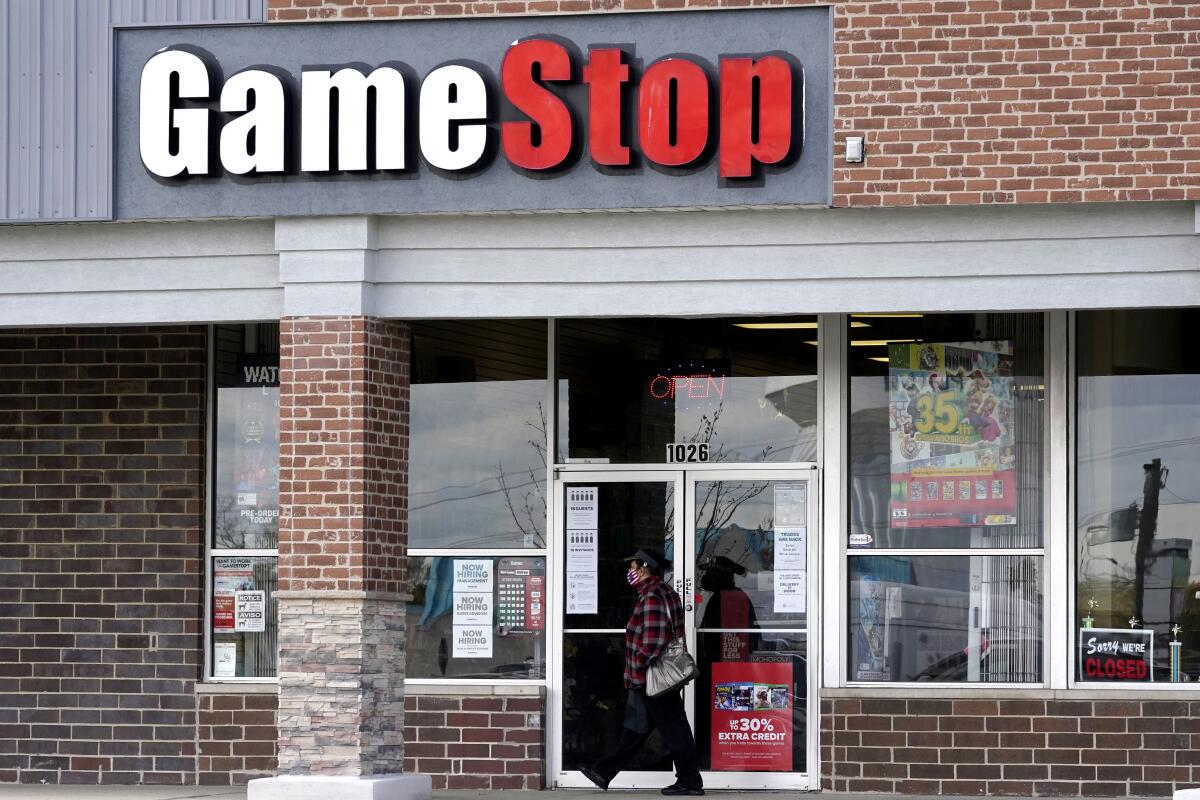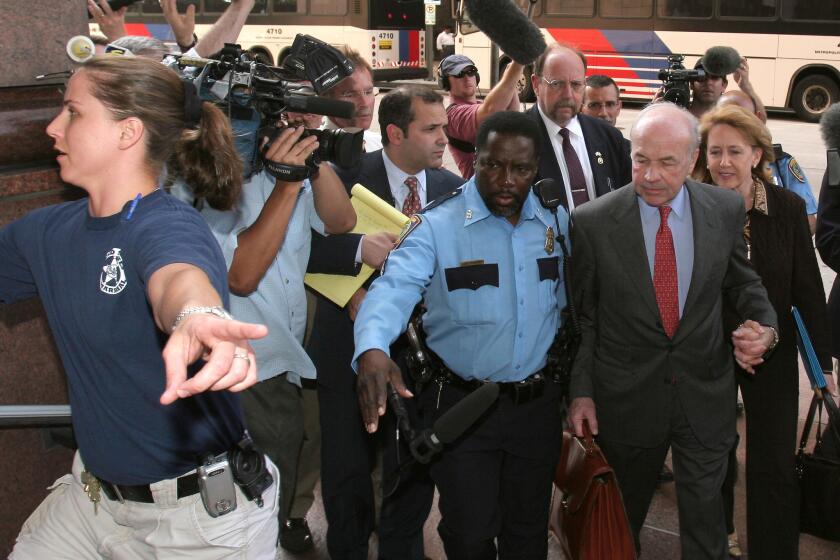Column: Explaining the Reddit-fueled run on GameStop

- Share via
One would almost expect the iconoclasts who populate online investment forums to appreciate short sellers.
After all, both communities are constantly on the prowl for investment opportunities that the big boys on Wall Street have overlooked, though the online denizens generally are looking for shares to buy, and the shorts for shares to sell.
Yet for some reason, the online traders have decided to stage a massive assault on short sellers by driving up the share price of a money-losing retailer of video games and consoles named GameStop.
You just can’t change a bad retailer.
— Andrew Left, GameStop skeptic
GameStop shares were trading in the $2-to-$4 range as recently as April. As I write, they’re at $132 and change, up more than 60% on the day. They’re up about 505% this year already.
This action has produced massive losses among short sellers, who thought GameStop was an OK stock to short a year ago.
Among the biggest losers is the hedge fund Melvin Capital Management, which is headed by a very well-known Wall Street star. Melvin’s reported losses on GameStop and other misplayed short bets forced it to seek a nearly $3-billion bailout from two other hedge funds this week.
On the Reddit forum WallStreetBets and among other small investors posting online, the glee is palpable. “You guys are making such an impact that these fat cats are worried that they have to get up and put in work to earn a living,” a moderator of the forum posted a few days ago.
All this trading in a company that hasn’t turned a profit since 2017 and is vulnerable to the pandemic’s effect on bricks-and-mortar retailing, as well as the shift in game buying from physical discs to downloads, has investment experts wondering what the hell is going on here. More to the point — where’s it ending?
Among the skeptics is Andrew Left, a prominent short seller who issued a negative analysis of GameStop via YouTube on Jan. 21 and has been so pummeled by abusive online investors since that he canceled a plan to hold an interactive discussion about the stock. At the time of his analysis, GameStop was trading in the $40s; he predicted that it would eventually fall back to $20.
It’s unclear, he said, whether GameStop will follow the path of J.C. Penney, which benefited from a moment of optimism but has since sought bankruptcy protection, or Blockbuster Video, which got swamped by technological change.
“You just can’t change a bad retailer,” Left said.
Northwest Biotherapeutics, a Bethesda, Md., firm with a purported cancer vaccine in development, has been in a long, bitter battle with short-sellers of its shares.
How short selling works
A quick primer on short selling is perhaps in order here.
Short sellers honor the Wall Street mantra to buy low and sell high, but they do so in reverse order. First, they sell high, by borrowing stock from shareholders and selling it. Second, they buy low, by picking up shares at a lower price and returning them to the lenders.
Obviously, for this method to work, the shares must decline in price. That’s what short sellers are betting on. So they’re constantly searching for companies that are overvalued, whether because their business models have flaws unsuspected by investors, or they’re havens for fraud (think Enron), or any other reason.
This makes shorts very unpopular among corporate managements, which prefer that the investment community focus on their upside and swallow their optimistic press releases uncritically, rather than pointing out the downside.
Some executives get downright childish about it, such as Elon Musk, who revels in how shares in his Tesla electric car company have remained buoyant despite short sellers pointing out that it makes money not by selling cars but by trading auto emission credits.
Musk and other executives love to portray short selling as almost un-American.
I’ve taken it upon myself to defend them on numerous occasions, including back in 2014 when a respected Washington financial columnist joined a biotech company named Northwest Biotherapeutics in accusing, without a shred of evidence, a very good financial writer of conniving with short sellers to drive the company down.
Northwest was trading above $5 a share then; it’s now at $1.40 and its future was still in doubt a few months ago, so the short sellers were right to be skeptical.
In truth, short selling is not only proper but also essential for the smooth functioning of the financial markets. As I’ve explained before, although corporate managements believe that unalloyed investor optimism is nirvana, it’s unhealthy for capitalism, just as living on a diet exclusively of Twinkies would be for human beings.
So, another high-flying company is being pummeled in the stock market.
Short sellers counteract this tendency. Shorts sounded early alarms about Enron and many other companies destined for collapse in ways that the investment world didn’t expect. Without shorts, not a few frauds would have continued, costing investors millions more than they did.
That said, short selling is an expensive and risky strategy. For one thing, when a company declares a dividend, short sellers don’t pocket the money but have to pay it out (to shareholders who lent their stock). They typically leverage their bets with borrowed money, so their interest costs can be high. All this can put time pressure on short sellers, so they can’t always hold their positions indefinitely.
Most important, their gains are capped and their potential losses are infinite. This is the reverse of the risk profile of long investors, who buy and hold shares. If you buy a stock for $20 and it falls to zero, you can’t lose more than $20; but your potential gains are unlimited if the stock keeps rising.
If you’ve shorted a stock at $20, your potential gain is $20, again if it goes to zero. (You sold at $20, and you’re buying it back, or “covering,” at zero.) But if the shares keep rising, your potential loss is unlimited.
This is the phenomenon behind the GameStop action. It’s known as a short squeeze. The stock bulls higher, eventually surpassing the capacity of the shorts to remain short. They bail out by covering — that is, buying — at a higher price, swallowing their losses. Their buying action pushes the stock even higher, forcing more shorts to cover, until finally all the short sellers are swept out.
Then what?
What fundamentals?
The promoters of GameStop shares say they have a good bullish case. It starts with Ryan Cohen, co-founder of the online pet supply merchant Chewy, who disclosed a sizable position in GameStop in August at about $8.45 a share. Early this month, Cohen was added to the GameStop board, fueling the latest frenzy.
Short sellers unjustly Wall Street’s whipping boy
The idea is that Cohen will mastermind a transformation of GameStop into an online powerhouse. But a few caveats are proper. First, the stock run-up is based less on a fundamental case for the company’s future growth than on a short-term case built around Wall Street trading patterns.
As Left pointed out, the same management that presided over GameStop’s decline into the retail doghouse is still in charge; most took their seats in mid-2019. Maybe Cohen will sweep them out, maybe not. But whether he can steer GameStop to a new course — and whether that course will work — is hardly a slam-dunk.
Moreover, even if one believes Cohen will work magic with GameStop, its current price is way out of line. At its current trade, its ratio of price to expected earnings for the next year is well beyond those of Apple and Walmart.
By the way, while GameStop reported on Jan. 11 that holiday sales were up 4.8% in its bricks-and-mortar stores compared with a year earlier, and online sales increased by 300%, online sales still accounted for only about one-third of all sales. Total sales were down 3.8%, the company said, largely because it has been closing stores.
Should you jump into GameStop? Far be it from me to issue investment advice. But price spikes can hit you where it hurts. If you bought along with Ryan Cohen in mid-2020, you’ve done great. If you were one of the buyers who pegged the shares at $159 on Monday, you were crushed when they closed that day at $76.79.
A short squeeze that can take a stock into the stratosphere can last longer than anyone expects, but they’re not usually based on long-term expectations.
So, if you want to play, have fun. You don’t have to shed tears for the short sellers — Melvin, after all, has access to billions of dollars in backup funding, which suggests that its backers think it will be around for the long term. If anyone thinks they’ve crushed Wall Street or short sellers for good, they’re going to be disappointed.
Finally, market frenzies are fun (for those on the right side of the trade) while they’re happening, but every merry-go-round ride comes to a halt sooner or later.
More to Read
Inside the business of entertainment
The Wide Shot brings you news, analysis and insights on everything from streaming wars to production — and what it all means for the future.
You may occasionally receive promotional content from the Los Angeles Times.












